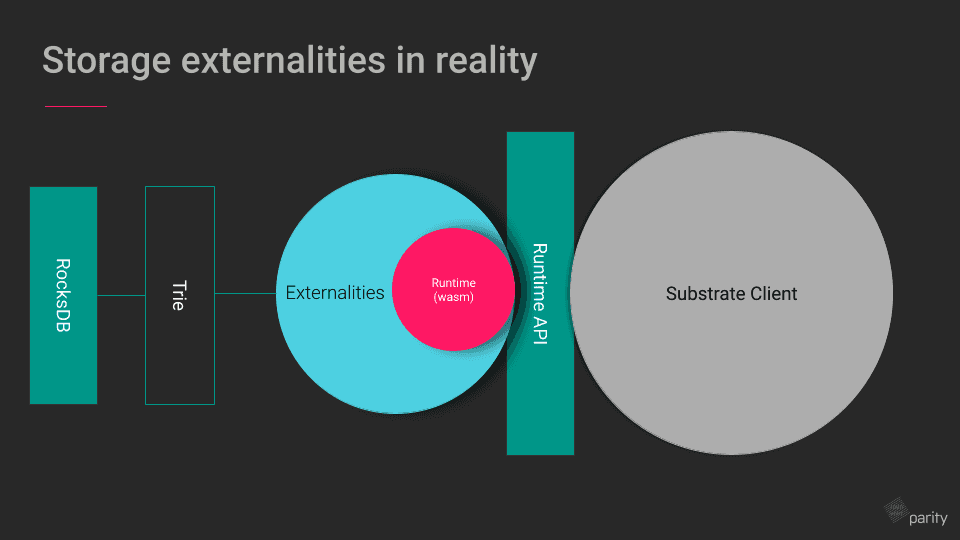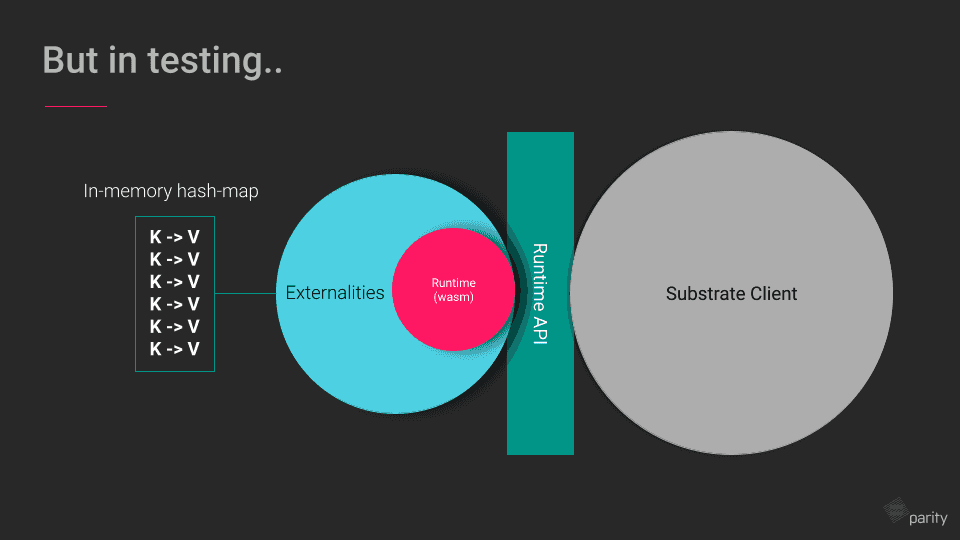Try Runtime
The try-runtime tool is built to query a snapshot of runtime storage, using an in-memory-
externalities to store state. In this way,
it enables runtime engineers to write tests for a specified runtime state, for testing against real
chain state before going to production. It is designed to be used as a command line interface to
specify at which block to query state.
In its simplest form, try-runtime is a tool that enables:
- Connecting to a remote node and calling into some runtime API.
- Scraping the specified state from a node at a given block.
- Writing tests for that data.
Motivation
The initial motivation for try-runtime came from the need to test runtime changes against state from a real
chain. Prior TestExternalities and BasicExternalities existed
for writing unit and integrated tests with mock data, but lacked an avenue to test against a chain's actual
state. try-runtime extends TestExternalities and
BasicExternalities by scraping state (which is stored with key value pairs) via a
node's RPC endpoints getStorage and getKeysPaged and inserting them
into TestExternalities.
How it works
The try-runtime tool has its own implementation of externalities called remote_externalities
which is just a builder wrapper around TestExternalities that uses a generic key-value store
where data is SCALE encoded.
The diagram below illustrates the way externalities sits outside a compiled runtime as a means to capture the storage of that runtime.
Storage externalities

Testing with externalities

With remote_externalities, developers can capture some chain state and run tests on it. Essentially, RemoteExternalities
will populate a TestExternalities with a real chain's data.
In order to query state, try-runtime makes use of Substrate's RPCs, namely StateApi. In particular:
storage: A method which returns a storage value under the given key.storage_key_paged: A method which returns the keys with prefix with pagination support.
Usage
The most common use case for try-runtime is with storage migrations and runtime upgrades.
There are a number of flags that need to be preferably set on a running node in order to work well with try-runtime’s expensive RPC queries, namely:
set --rpc-max-payload 1000to ensure large RPC queries can work.set --rpc-cors allto ensure ws connections can come through.
Combine try-runtime with
fork-off-substrate to test your chain before
production. Use try-runtime to test your chain's migration and its pre and post states. Then,
use fork-off-substrate if you want to check that block production continues fine after the
migration, and do some other arbitrary testing.
Calling into hooks from OnRuntimeUpgrade
By default, there are two ways of defining a runtime upgrade in the runtime. The OnRuntimeUpgrade trait provides the
different methods to achieve this.
From inside a runtime. For example:
struct Custom; impl OnRuntimeUpgrade for Custom { fn on_runtime_upgrade() -> Weight { // -- snip -- } }From inside a pallet. For example:
#[pallet::hooks] impl<T: Config> Hooks<BlockNumberFor<T>> for Pallet<T> { fn on_runtime_upgrade() -> Weight { // -- snip -- } }
These hooks will specify what should happen upon a runtime upgrade. For testing purposes, we prefer having hooks that allow us to inspect the state before and after a runtime upgrade as well.
These hooks are not available by default, and are only available under a specific feature flag, named
try-runtime.
The new hooks are as follows:
#[cfg(feature = "try-runtime")]
fn pre_upgrade() -> Result<(), &'static str> { Ok(()) }
#[cfg(feature = "try-runtime")]
fn post_upgrade() -> Result<(), &'static str> { Ok(()) }
Helper functions
OnRuntimeUpgradeHelpersExt are a set of helper functions made available from
frame_support::hooks in order to use try-runtime for testing storage migrations.
These include:
storage_key: Generates a storage key unique to this runtime upgrade. This can be used to communicate data from pre-upgrade to post-upgrade state and check them.set_temp_storage: Writes some temporary data to a specific storage that can be read (potentially in the post-upgrade hook).get_temp_storage: Gets temporary storage data written byset_temp_storage.
Using the frame_executive::Executive struct, these helper functions in action would
look like:
pub struct CheckTotalIssuance;
impl OnRuntimeUpgrade for CheckTotalIssuance {
#[cfg(feature = "try-runtime")]
fn post_upgrade() {
// iterate over all accounts, sum their balance and ensure that sum is correct.
}
}
pub struct EnsureAccountsWontDie;
impl OnRuntimeUpgrade for EnsureAccountsWontDie {
#[cfg(feature = "try-runtime")]
fn pre_upgrade() {
let account_count = frame_system::Accounts::<Runtime>::iter().count();
Self::set_temp_storage(account_count, "account_count");
}
#[cfg(feature = "try-runtime")]
fn post_upgrade() {
// ensure that this migration doesn't kill any account.
let post_migration = frame_system::Accounts::<Runtime>::iter().count();
let pre_migration = Self::get_temp_storage::<u32>("account_count");
ensure!(post_migration == pre_migration, "error ...");
}
}
pub type CheckerMigrations = (EnsureAccountsWontDie, CheckTotalIssuance);
pub type Executive = Executive<_, _, _, _, (CheckerMigrations)>;
CLI interface
To use try-runtime from the command line, run your node with the --features=try-runtime flag.
The possible sub-commands include:
on-runtime-upgrade: Executes "tryRuntime_on_runtime_upgrade" against the given runtime state.offchain-worker: Executes "offchainWorkerApi_offchain_worker" against the given runtime state.execute-block: Executes "core_execute_block" using the given block and the runtime state of the parent block.follow-chain: Follows a given chain's finalized blocks and applies to all its extrinsics. This allows the behavior of a new runtime to be inspected over a long period of time, with real transactions coming as input.
For example, running try-runtime with the "on-runtime-upgrade" subcommand on a chain
running locally:
cargo run --release --features=try-runtime try-runtime on-runtime-upgrade live ws://localhost:9944
Other scenarios
Using it to re-execute code from a ElectionProviderMultiPhase off-chain worker on localhost:9944:
cargo run -- --release \
--features=try-runtime \
try-runtime \
--execution Wasm \
--wasm-execution Compiled \
offchain-worker \
--header-at 0x491d09f313c707b5096650d76600f063b09835fd820e2916d3f8b0f5b45bec30 \
live \
-b 0x491d09f313c707b5096650d76600f063b09835fd820e2916d3f8b0f5b45bec30 \
-m ElectionProviderMultiPhase
--uri wss://localhost:9944
You can pass in the --help flag after each subcommand to see the command's different options.
Run the migrations of the local runtime on the state of SomeChain, for example:
RUST_LOG=runtime=trace,try-runtime::cli=trace,executor=trace \
cargo run try-runtime \
--execution Native \
--chain somechain-dev \
on-runtime-upgrade \
live \
--uri wss://rpc.polkadot.io
Running it at a specific block number's state:
RUST_LOG=runtime=trace,try-runtime::cli=trace,executor=trace \
cargo run try-runtime \
--execution Native \
--chain dev \
--no-spec-name-check \ # mind this one!
on-runtime-upgrade \
live \
--uri wss://rpc.polkadot.io \
--at <block-hash>
Next steps
Learn more
- Refer to this how-to guide on how to integrate
try-runtimeto your project. - Read more about Storage keys
OnRuntimeUpgradeFRAME traittry-runtime-upgradefromframe_executiveset_storagefromsp_core::traits::Externalitiesstorage_keys_pagedfromsc_rpc::state::StateApi
Examples
try-runtimein FRAME's Staking pallet